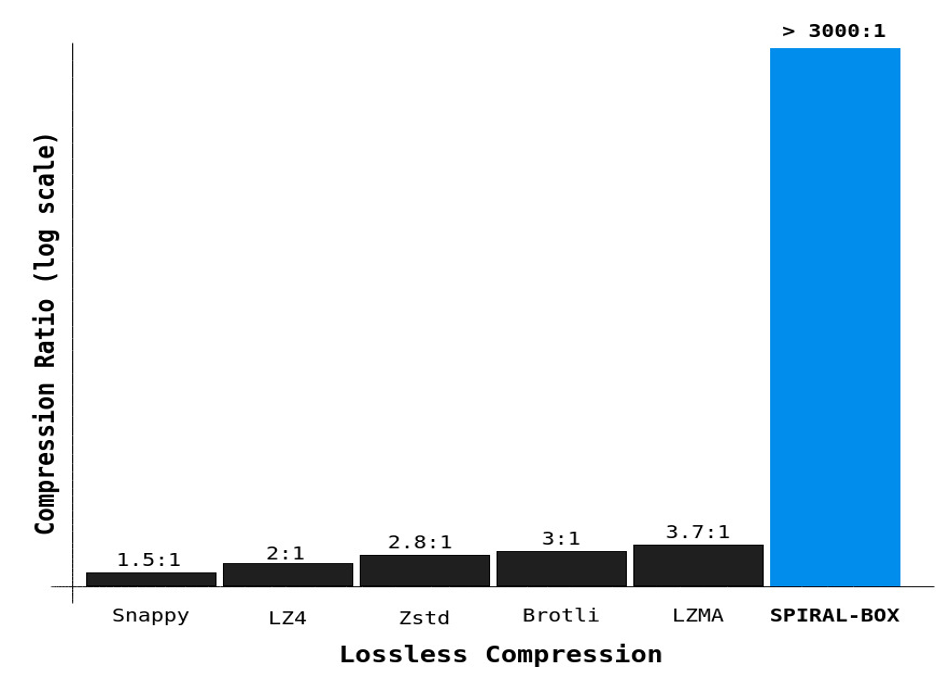CENTRAL SPIRAL—Developing new mathematical encoding tools to compress large and complex datasets.
DATE: Wednesday, April 2, 2025
TIME: 11:00 a.m. - 12:00 p.m. ET
LOCATION: Virtual (register for webinar link)
SPEAKERS: Andres H Serna and Eduin Serna, Founders of CENTRAL SPIRAL
ABSTRACT

In today’s digital era, the rapid creation and exchange of data present unprecedented challenges for storage and transmission. Conventional compression methods—ranging from dictionary-based techniques (LZ family) to entropy-based approaches (Huffman coding, arithmetic coding, Finite State Entropy, Asymmetric Numeral System)—typically yield modest results. At CENTRAL SPIRAL, we have developed a new mathematical encoding tool that compresses even random data larger than 1KB. This innovative approach allows our patented lossless compression technology to achieve dramatic file size reductions, ensuring substantial savings in storage and bandwidth while maintaining data integrity and accessibility.
A compelling demonstration of our technology’s effectiveness is provided by our work in the Immersion Lab. During a focused two-hour session, we collected 239.2 GB of immersive data, including high-resolution spatial 3D scans that capture detailed physical environments, intricate architectural space models, Unreal Engine templates for XR experiences, and real-time motion capture data. Consider, for instance, the Lenscloud 3D scanner—a tool capable of producing high-volume, 360-degree scans of human bodies and large objects. Equipped with 120 cameras and custom software, it rapidly captures detailed photogrammetric data. In one case, two sets of 240 images (120 for texture and 120 for geometry), totaling 989MB, were compressed to just 257KB. Notably, when we attempted to compress these JPG files with conventional tools like ZIP or 7z, no significant reduction was achieved since JPG files are already highly optimized by their own algorithms.
Furthermore, for our OptitrackTraining dataset, we obtained an AVI video file of 179MB. Conventional compression tools like 7z only reduced the file to 157.1MB—yielding a ratio of roughly 1.14:1—because such formats are already highly optimized. In contrast, our technology is designed to compress data even after it has been processed by other methods. Using our solution, we reduced the original video to just 1.9KB, achieving a compression ratio of 96471:1, achieving an astonishing compression ratio. This dramatic reduction not only streamlines data management but also drastically accelerates transfer times, enabling faster access and more agile decision-making.
This innovative approach not only lowers operational costs and enhances efficiency but also reduces energy consumption and CO₂ emissions. By bridging the gap between large-scale data capture and agile digital management, our solution has the potential to transform how immersive experiences and complex datasets are stored, transmitted, and utilized—paving the way for faster, more secure, and more sustainable digital infrastructures.
about immersed
IMMERSED is a seminar in which we explore the possibilities enabled by immersive technology and interactive experiences. Technologies such as motion capture, virtual and augmented reality, photogrammetry, and related computational advances bestow the power to gather, process, and interact with data from multiple modalities, providing unique insights and fostering interdisciplinary collaborations.
IMMERSED examines how immersive technology is shaping innovations across the sciences and the arts through a mix of lectures, demonstrations, and tutorials. IMMERSED is sponsored by the MIT.nano Immersion Lab, which provides space, tools, and a platform to connect scientists, engineers, artists, performers, and others through creative projects that bridge multiple disciplines.
To receive event announcements, sign up for our email list.
